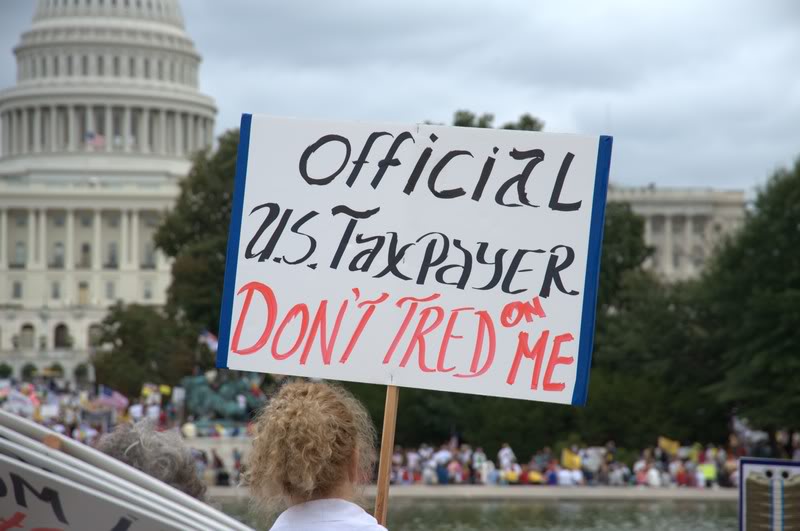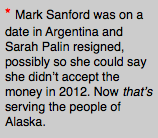
As opposed to all those unofficial US taxpayers, the Chinese. Props to moronswithsigns.blogspot.com.
Students of history—particularly my students of history—will remember Ronald Reagan’s genius unification of the Republican Party during the 1980 election. Through sheer strength of charisma and occasionally insane rhetoric, Reagan consolidated three fundamentally disparate groups—old-time political conservatives, the nouveau riche, and church people—into what we now recognize as the contemporary GOP. Those of us who grew up under Reagan tend to take this alliance for granted, but it wasn’t always so. For most of the twentieth century, evangelical Christians were a reliable constituency of the Democratic Party, and the newly wealthy were anybody’s guess. The Great Communicator’s success as a politician, if not as a President, was his ability to describe the Republican agenda in terms these three groups understood. Hence the Evil Empire speech, in which the principle feature of communism is the abolition not of private property but of religion. “I would rather see my little girls die now, still believing in God, than have them grow up under communism,” sounds like an utterly bonkers thing for the President of the United States to say into a microphone, but that microphone was provided by the National Association of Evangelicals. When he spoke to the Club For Growth, it was all tax cuts and welfare queens, and when he spoke to the hawks in Congress, it was the Strategic Defense Initiative. All of it boiled down to one easily digestible GOP platform, and there lied the genius of Ronald Reagan.
The problem, of course, is that the actual interests of church deacons in Biloxi and hedge fund managers on the Upper East Side rarely overlap. Gordon Gekko doesn’t really care what the homos do, and Charlie Church does not make over $250,000 a year. Reagan was made possible in part by the problem of international communism, which combined free market economics, religion and foreign policy in a way that was politically miraculous. Reagan’s pale imitator, George W. Bush, got his own pale imitation of the Cold War with 9/11. Terrorists hate our freedom—that is, our ability to buy stuff—and they just happen to be fanatical adherents to the world’s fastest-growing competitor to Christianity. As we approach 2010, however, the connection between tax cuts for the rich, Jesus Christ, and defense spending grows increasingly difficult to understand. The coalition that has empowered the Republican Party since 1980 is weakening, and the unlikely political edifice that is the GOP has begun to shake at its base.
David Frum sees this month’s debacle in New York’s 23rd Congressional District as the first tremor, and next year’s Florida gubernatorial election as the quake. Just as the national party apparatus threw Republican stalwart Dede Scozzafava under the bus for her insufficient opposition to gay and abortion rights, so too are key members of the GOP now abandoning incumbent governor Charlie Crist for accepting federal stimulus money. As Frum points out, Crist didn’t have much of a choice. He was constitutionally required to balance the state budget, and with state revenues down 11.5% in the wake of the 2008 collapse, he took what the feds were offering. That decision has given ammunition to his opponent, Marco Rubio, who has announced that he would have rejected the stimulus money and instead balanced the state budget with $6 billion in unspecified tax cuts.
Rubio’s nonexistent responsibilities as the former Speaker of the House of the Florida legislature mean he can make such statements without having to actually govern by them. His position is weirdly similar to that of the populist base of the Republican Party. The evangelicals Reagan brought into the GOP were courted with rhetoric but rarely influenced policy, since they primarily cared about social issues. All the party leadership had to do was convince them that tax cuts, deregulation and defense spending were somehow moral issues. Moral issues are something these people understand, and now the GOP has to deal with an evangelical base that believes states’ rights and zero federal spending have the force of biblical law. Never mind that Florida would have gone broke if Crist hadn’t taken that stimulus money, or that 47 other governors* did exactly the same thing. It was a sin.
broke if Crist hadn’t taken that stimulus money, or that 47 other governors* did exactly the same thing. It was a sin.
Such a mindset makes it easy to campaign and impossible to govern. The same crowd that delivered rural America to the GOP in ’80, ’84, ’00 and ’04 has stopped waving Bibles and started waving copies of the Constitution, which they haven’t read either. Meanwhile, the economic collapse and the various stimuli it prompted have brought into conflict the factions that Reagan united. The $250k-plus crowd desperately supports every bank bailout you can think of. The old guard recognizes the need to actually make laws and compromise and spend money and stuff, and the populist base is dressing up like Paul Revere. Such disparate aims do not a stable coalition make.
The great gamble of the Reagan campaign was that the populist base of the Republican Party could be radicalized economically just as much as they had been religiously. It worked, but in the process it created a bloc of political snake handlers. The fervent free-market, zero-government passions of reactionary populism are the inevitable endpoint of a constituency trained to think of tax structures and federal spending as a moral issue. That these people threaten to tear apart the same contemporary GOP they helped make is merely ironic. What will happen to the GOP, and where the revivalists will go once the big tent collapses, is a little scary.




Excellent article.
I have hopes that the non-rivalists sect of the GOP will break off and form a coalition with the Bill Clinton Democrats. This will give our nation three major political parties: (1) the Huckabee rivalists, (2) the Clinton/Romney/Govenator pragmatists, and (3) the Dean (Obama?) progressives.
Instead of being “a little scary,” I think this could be the best possible solution for our current political climate.
“The same crowd that delivered rural America to the GOP in ‘80, ‘84, ‘00 and ‘04 has stopped waving Bibles and started waving copies of the Constitution, which they haven’t read either.”
Zing!